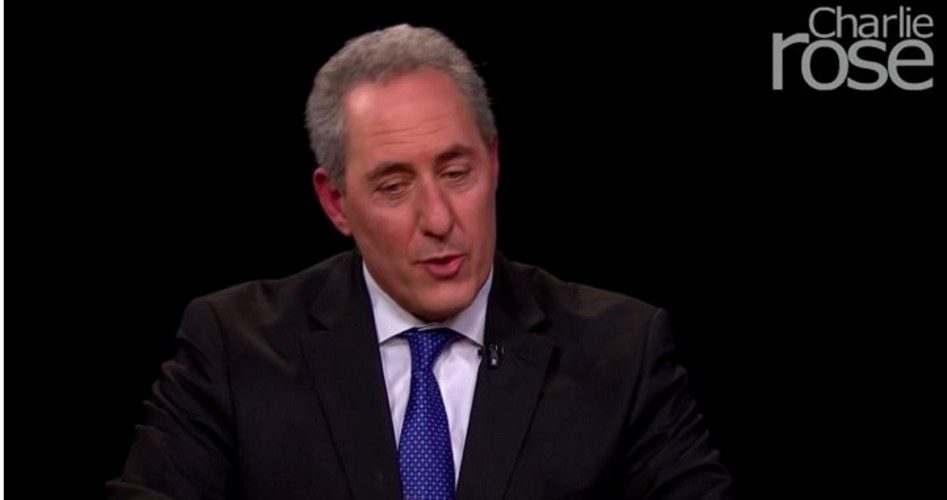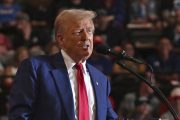
U.S. Trade Representative (USTR) Michael Froman (shown) is bullish on the approval by Congress of the Trans-Pacific Partnership (TPP) within the year.
During a speech delivered at the Council on Foreign Relations (CFR), Froman said that in light of the broad support throughout the U.S. economy for the trade deal, he believed it would be ratified before the end of Barack Obama’s presidential administration. “That support is beginning to trickle through to members of Congress,” he said at CFR headquarters in New York City.
“I’m spending a lot of my time, when I’m not traveling abroad, up on the Hill talking to members of Congress and the good news is that as they dig into the details and they see what’s in it for their constituents, which is their primary driving force behind their decision-making, they’re seeing the potential, the positive upside and what’s at risk in not getting it done,” he added.
As The New American has reported, however, there is widespread opposition to the so-called trade deal among congressmen and their constituents, including from the dairy and auto industries.
Froman is undaunted, though. “I think at the end of the day there will be the necessary support to get it done,” he assured CFR attendees.
What, exactly, would the TPP “get done”?
The New American’s Senior Editor William Jasper is an authority on the threat to U.S. sovereignty and economic well-being posed by the TPP. In June 2015, Jasper identified one of the unpublished goals of the globalists pushing for passage of the TPP: integration with China.
“As The New American has pointed out many times over the past few years (see here, here, and here), the architects of the TPP — especially the world government activists of the Council on Foreign Relations (CFR) and the Peterson Institute for International Economics (PIIE) — have long been on record in favor of the TPP as merely a “stepping stone” to a much larger Free Trade Area of the Asia Pacific (FTAAP) that would include China as a member. The anti-Beijing rhetoric is purely a ruse to lure support from conservatives concerned over China’s stepped-up militancy, as well as domestic manufacturers and labor unions worried about loss of more manufacturing business and jobs to the Beijing behemoth,” Jasper explained.
Furthermore, as part of the TPP’s economic integration, the U.S. economy would be weighted down by the grossly disparate gross domestic products of the trade pact’s member countries. As I wrote in 2013:
In September [2013], the World Bank released the GDP rankings for every country in the world. The data for the 12 TPP partners, China, and South Korea (both Asian nations are considering appealing to join the TPP before year’s end) are provided below:
• The United States ranks first with a GDP of over $15.68 trillion.
• China is second with a GDP of $8.3 trillion, a little more than half that of the United States.
• Japan is next with a GDP of $5.9 trillion. That ranks third worldwide, behind the United States and China.
• Canada ranks 11th with a GDP of about $1.8 trillion.
• Australia ranks 12th with a GDP of about $1.52 trillion.
• Mexico ranks 14th with a GDP of just over $1.17 trillion.
• South Korea comes in just below Mexico with a GDP of nearly $1.13 trillion.
• Malaysia ranks 34th in the world with a GDP of right at $303 billion.
• Singapore ranks 35th with a GDP of about $274 billion.
• Chile ranks 36th with a GDP of about $268 billion.
• Peru ranks 50th with a GDP of about $197 billion.
• New Zealand ranks 55th with a GDP of just over $157 billion.
• Vietnam ranks 57th with a GDP of nearly $142 billion.
• Brunei ranks 112th with a GDP of just shy of $17 billion
From a purely mathematical perspective, U.S. participation in the TPP doesn’t add up. The combined GDPs of the TPP countries excluding China and Japan equal roughly one-third of that of the United States. The relevant question is whether partnership with these countries will result in a strengthening of their economies or a weakening of our own.
Admittedly, a country’s GDP is only one of many relevant metrics that could be used to compare relative global economic position. The fact is, however, that when looking at just that, it is evident that the Obama administration is anxious to fix the economic prosperity of the United States to countries whose relative weakness will pull it down.
Finally, Froman sees that the only hurdle that could slow lawmakers’ approval of the TPP is the agreement’s intellectual property provisions.
Froman is smart to see this as an obstacle. WikiLeaks described the Intellectual Property Rights (IPR) provisions as “the most controversial chapter of the TPP.” This chapter deserves that designation because of its substantial effect on so many aspects of American trade and industry, including what would be irreparable harm to “medicines, publishers, internet services, civil liberties and biological patents.”
A good number of commentators are pointing to the SOPA-like provisions contained in the IPR chapter.
SOPA is an acronym for the controversial Stop Online Piracy Act — legislation that has failed repeatedly to pass in Congress. The name of the bill, like so many other inappropriately named federal follies (Affordable Care Act?), has nothing to do with the real intent: granting government control over the content and traffic on the Internet.
In an article reporting on the IPR chapter, Internet freedom and fair copyright advocate TorrentFreak points out the SOPA similarities in the TPP intellectual property chapter:
Burcu Kilic, an intellectual property lawyer with Public Citizen, says that some of the proposals in the text evoke memories of the controversial SOPA legislation in the United States.
“The [IPR] text also features Hollywood and recording industry inspired proposals — think about the SOPA debacle — to limit Internet freedom and access to educational materials, to force Internet providers to act as copyright enforcers and to cut off people’s Internet access,” Kilic says.
This section of the draft agreement launches another attack on U.S. sovereignty through the mandate that member nations enact regulations requiring Internet Service Providers (ISPs) to privately enforce copyright protection laws.
These private companies — many of which are very small — would be forced to take upon themselves the responsibility of patrolling for and punishing any violation of the copyright laws by their subscribers.
Current U.S. law — specifically the Digital Millennium Copyright Act (DMCA) — would be supplanted by TPP Article 16.3. This provision in the TPP draft document paves the way for a new copyright enforcement scheme that extends far beyond the limits currently imposed by DMCA. In fact, it contains mandates more expansive than even those contained in ACTA.
ACTA is widely regarded as a threat to Internet freedom, as well as to the legislative power of the Congress. If ACTA is a threat, then TPP is an all-out frontal assault.
Regardless of the flaws of the DMCA, it is U.S. law and should not be subject to de facto repeal by the work of a body of internationalists who are not accountable to citizens of the United States.
Critics understand that this redrawing of the boundaries of copyright law by the globalists secretly deliberating and drafting the TPP is an attack on our laws, our courts, our freedom of expression, our Constitution, and our sovereignty.
Congress is unlikely to vote on the TPP agreement before the elections in November. In the meantime, the CFR has telegraphed that it will not tolerate the “opening up a Pandora’s box of renegotiation.”
Congress, the CFR insists, must approve or reject the TPP in its current iteration.
Americans wary of economic and political integration with countries without our history of the rule of law or our financial potency should contact their representatives to make sure that the TPP is not passed this year, next year, or ever.



